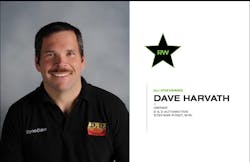“Goodwill comes back to you tenfold,” David Harvath, owner of D & D Automotive in Stevens Point, Wis., says.
From a young age, Harvath was aware of the way that automotive repair shop staff treated people and how that could negatively impact them. Harvath grew up with a single mother who was often mistreated and taken advantage of by auto repair shops. Harvath remembers hearing her cry at night after encounters where the staff talked down to her or sold her a repair that she may have been unnecessary.
Fast forward years later, where Harvath was working as a technician for a chain store. Harvath injured his knee, so he was unable to work for a period of time. When he came back, one of his longtime customers came to him upset about a repair. Upon some digging, he found that the shop had taken advantage of her and sold her a used engine under the guise that it was new and charged her as such. With this knowledge, Harvath walked and went on to open his own shop.
Those two experiences played a pivotal role in how Harvath runs his shop today: honest, fair and empathic. And that goes for all customers.
Adapted Work
Harvath stumbled onto this new revenue stream almost the same way that he decided to leave his former employer and start his own shop—by encountering mistreated customers. Customers with disabilities, for example, wheel-chair users would talk about their encounters with facilities that were approved for work on adapted vehicles.
“I would talk to them and they would say that they wouldn’t be able to get their adaptations fixed and they were treated very poorly,” Harvath says.
So, he took matters into his own hands. It turns out, there’s no certification needed to perform work on disability adaptations in vehicles—just knowledge. Harvath looked into the rules and regulations for performing proper work on adaptations and reached out to service providers to get on their recommended repair facility lists. Once he went through all of that, he got to work. By treating his customers with respect, he’s gained positive word-of-mouth and now has clients that come to him from 200 miles away. In addition to repairs, he also provides wheelchair lift installations, which has helped add to his bottom line. In 2019, customers that get adapted work done for disabilities have brought in roughly $44, 250.
DWI Device Installation
Harvath installs Intoxalock device installations (a car breathalyzer that requires a driver to blow in it before the car will start) for people with DWIs for two reasons: everyone makes mistakes and it’s a community service.
“It keeps the roads safer for all drivers and passengers,” Harvath says.
Harvath doesn’t make money off of the actual installation, but instead does it out of the goodness of his heart and the peace of mind that he gets knowing that his family will be safer driving on the road. Plus, he has empathy for people in this situation and understands that they still need a way to get to and from work and provide for their own families.
In order to do this, he had to reach out to the court system in his area and go through an application process to become a preferred installer. Now, his shop is on the list of providers for one of the companies—Intoxalock—that provides this device. He charges only for the time it takes to install the unit and doesn’t mark anything up.
With this type of work, Harvath is very careful not to shame or act above the customer, but rather treats him or her with respect, which earns him repeat customers and referrals. This year, he’s earned roughly $51,253 from customers that have had an Intoxalock device installed.
Low Income Repairs
Harvath saw a market to aid those with a low income that need car repairs. So, he did something about it. As a NAPA shop owner, Harvath went to the company to talk about an idea he had to fund repairs for lower-income families. NAPA looked into it and contacted United Way, who received funding from its donors for $10,000 to fund the project, which is now called In-a-Fix.
Through In-a-Fix, individuals who need car repairs can apply and see if they qualify for the program. The individual is required to put up $50, but the program will fund the rest of the repair up to $500. Harvath doesn’t make any money from the individual, but saves his receipts, then invoices it to NAPA, who then sends him a 35 percent markup.

